
Blockchain technology is turning the tables across industries, making things more transparent, efficient, and accountable. Its decentralized structure and unchangeable records make maneuvering around sustainability challenges more effective. Organizations can monitor their impacts on the environment, incentivize ethical business practices, and optimize their resources. By securely tracking data in a sense that cannot be tampered with, blockchain assists tackle sustainability issues which supports constructing a sustainable future.
One of blockchain’s biggest contributions to sustainability is improving supply chain transparency by providing an end-to-end view of how goods and resources move to ensure ethical sourcing and cutting down on waste. Smart contracts, which are self-executing agreements that operate on pre-defined instructions, help reduce human-induced errors by automatically implementing the environmental standards of the contract. These features increase efficiency and improve consumer and other stakeholders' confidence in the operations.
Besides supply chains, blockchain is also shaking up the energy sector. It enables decentralized energy systems where communities can trade renewable energy directly with one another. This peer-to-peer model lessens dependence on traditional power grids and encourages the use of clean energy. Additionally, blockchain simplifies tracking carbon credits and emissions, creating a reliable system for climate action. By providing a secure and transparent way to share environmental data, it fosters collaboration between businesses, governments, and individuals—aligning everyone toward common sustainability goals.
By weaving blockchain into sustainability efforts, we can undertake environmental challenges with greater impact and go nearer to a future that’s not just greener but also smarter and more resilient.
Understanding Sustainability
Stability is about businesses working in a way that considers their impact on the environment and encourages them to look beyond profits and also reflect their functions that affect the planet and society. Briefly, stability means not endangering future generations' ability to meet today's needs.
How Can Features of Blockchain Support Sustainability?
As some of the leading tech companies in the world actively explore ways to use blockchain technology more effectively, its enormous potential for sustainability is becoming clearer. To evaluate a candidate’s understanding of these concepts and their potential impact on the world, some organizations also add questions about blockchain and sustainability in their recruitment process. In addition, blockchain companies can help reduce negative environmental effects by eradicating false goods and preventing unstable practices in supply chains.
Below are several key explanations of how can features of blockchain support sustainability efforts, highlighting their applications in different industries
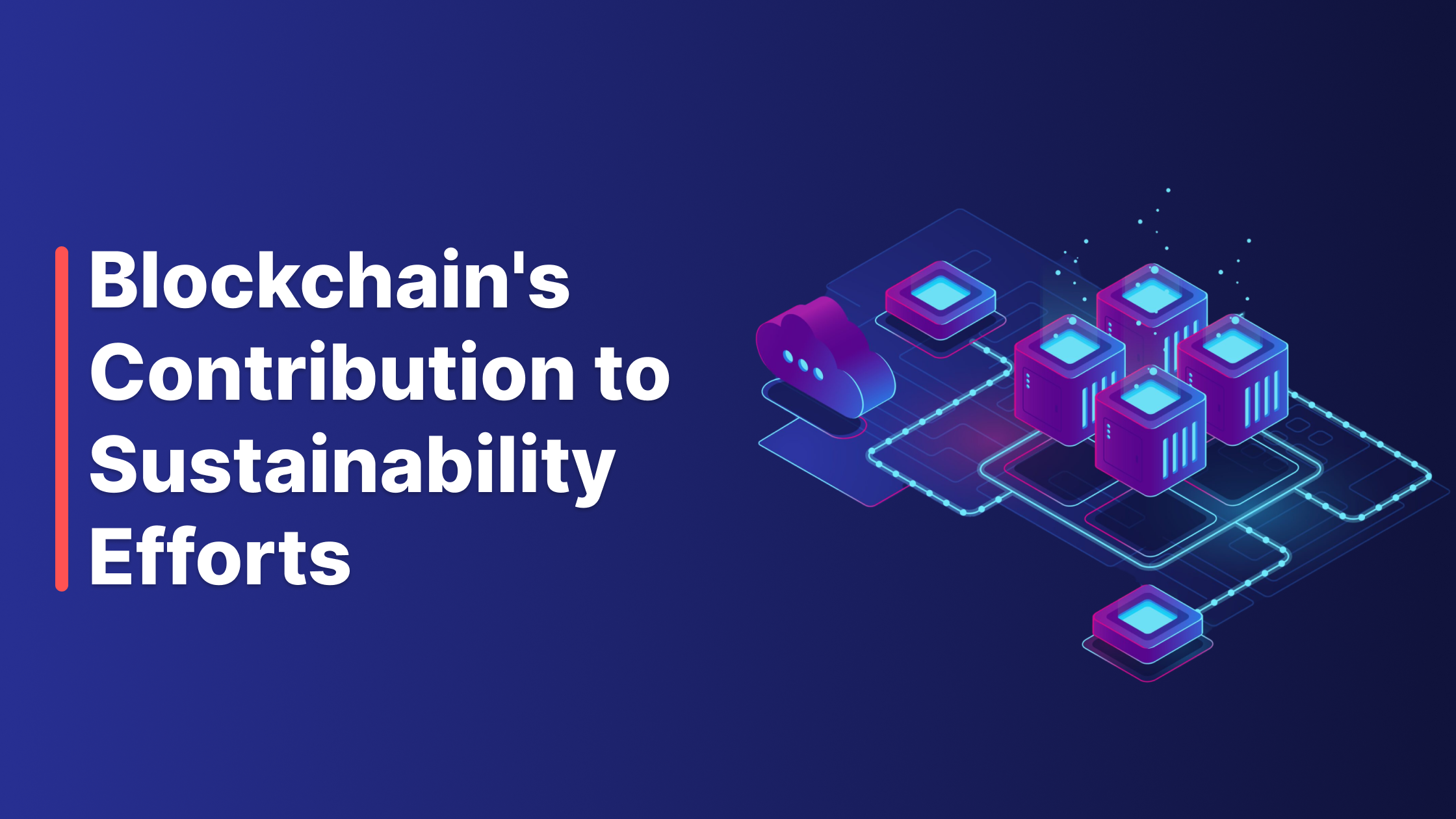
Blockchain and Sustainability in Decentralization
A key demonstration of how can features of blockchain support sustainability lies in its ability to enable trustless transactions.
Traditional transaction methods often led to inefficiencies, corruption, and a lack of clarity due to their reliance on centralized authorities. Blockchain technology reduces the risk of scams and unethical practices by storing transactions in a decentralized manner, which enhances transparency and allows for faster, more efficient business transactions.
This decentralized control feature of blockchain supports sustainability efforts by guaranteeing fair trade practices, ethical sourcing of materials, and the reduction of carbon footprints.
Blockchain and Environmental Sustainability
The tracking and reporting of emission reductions are significantly enhanced by blockchain technology, which facilitates effective greenhouse gas accounting. By leveraging Blockchain technology, businesses can prevent double counting, ensuring accurate reporting figures. Furthermore, Blockchain enhances compliance with environmental practices, promoting transparency and sustainable growth.
Another example of how can features of blockchain support sustainability is by streamlining the entire carbon credit issuance, trading, and verification process. A decentralized ledger meticulously documents the entire lifecycle of carbon credits, ensuring they are transparently auditable. This reduces administrative costs, enhances trust, and broadens access to carbon credits through improved efficiency and transparency. This feature of blockchain supports driving sustainable growth and encouraging the reduction of greenhouse gas emissions.
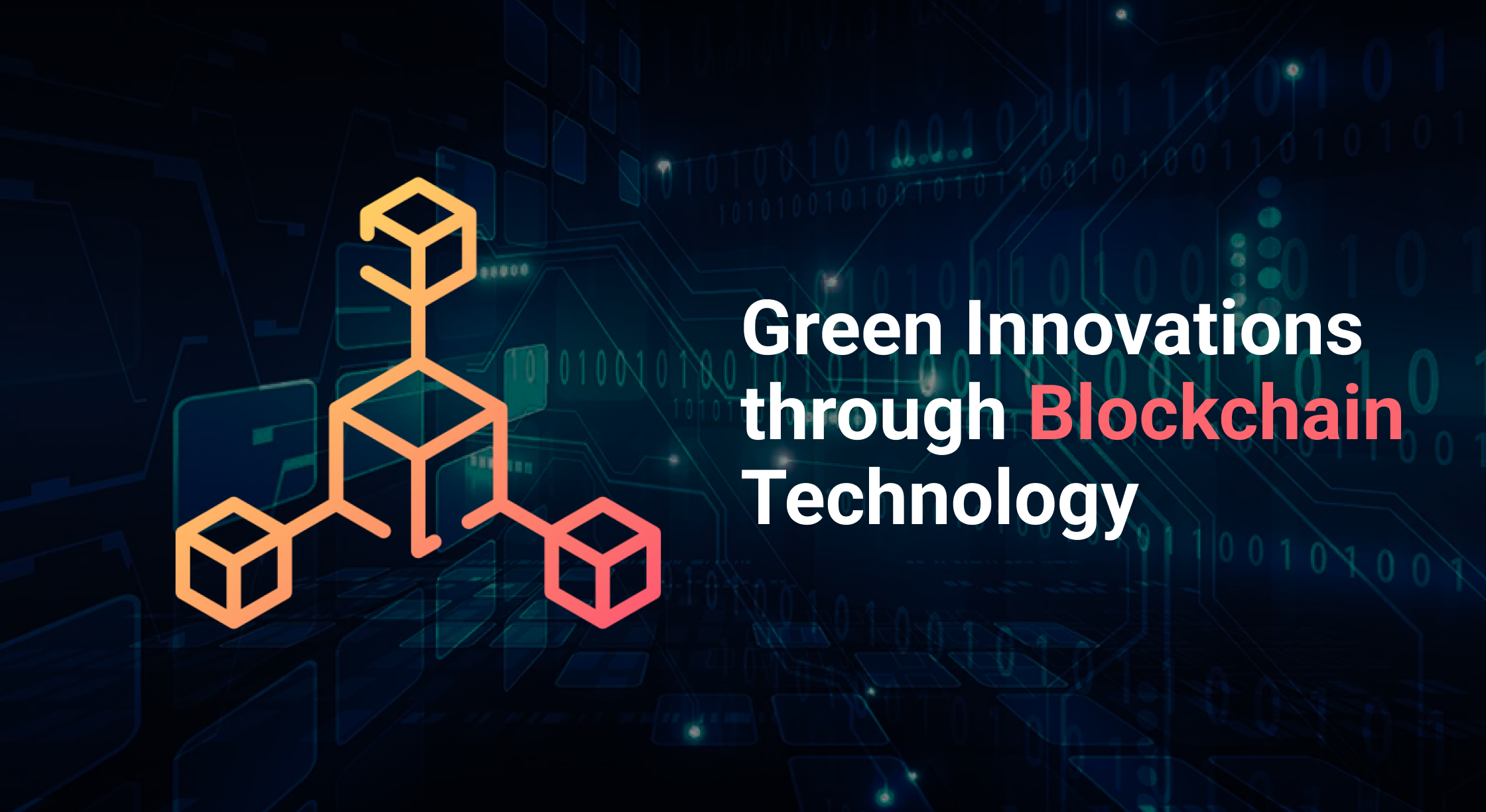
Blockchain And Sustainability In Green Finance
Utilizing blockchain technology can substantially boost funding for green businesses by fostering transparency, trust, and direct investment
One powerful way how can features of blockchain support sustainability is through crowdfunding for sustainability. Blockchain enables secure and transparent crowdfunding platforms, allowing green businesses to raise funds directly from eco-conscious investors. This access to capital supports projects like renewable energy and sustainable agriculture, opening new pathways for impactful, community-supported environmental initiatives.
Peer-to-peer green finance is another innovative approach made possible by blockchain. Through secure, direct financial transactions, individuals can invest in sustainable projects without intermediaries, lowering costs and empowering people to support causes they care about. This decentralized model connects individuals directly to the environmental projects they value, creating a more personal investment experience.
Lastly, blockchain’s transparency and security help build trust among green investors. With its open ledger, investors can see how their funds are used, ensuring their contributions support genuine, impactful green projects. This added accountability can attract more investment in sustainability, helping eco-friendly businesses and the green economy to grow.
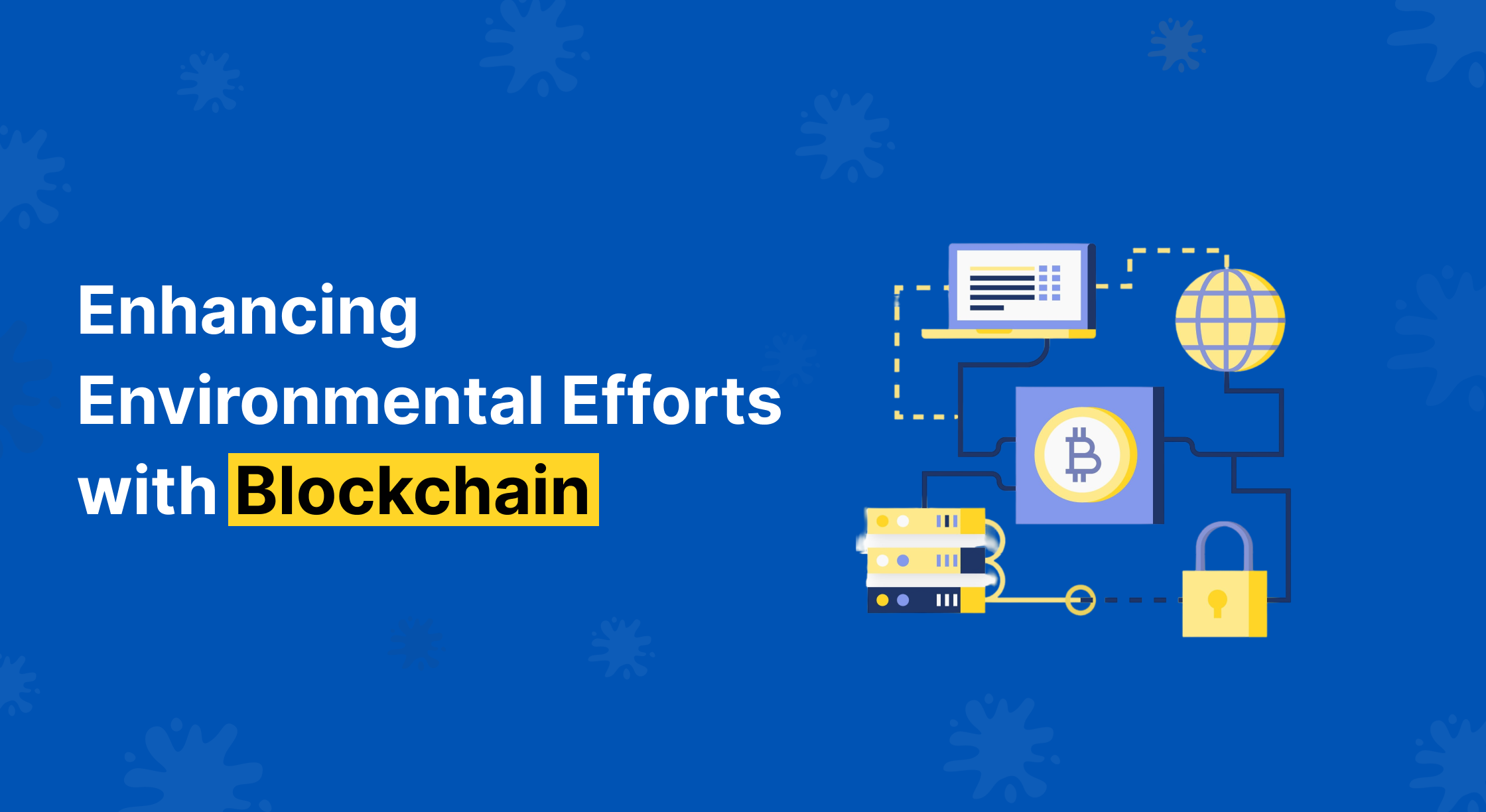
Blockchain and Sustainability In Waste Management
Blockchain technology is becoming a more effective tool for improving recycling programs and incentives. Here's how it works:
Rewarding with Crypto Tokens: Imagine earning digital points for recycling. Blockchain systems use these digital tokens, called crypto tokens, to financially reward people and organizations for their recycling efforts
Tracking Progress: Just like keeping receipts, blockchain keeps track of everything. In this case, it tracks the volume of materials recycled, the associated costs, and even the revenue generated from selling these recyclables.
Environmental Impact: Blockchain goes beyond just tracking numbers. It can also factor in the environmental impact of recycling. For instance, recycling a specific amount of material can show how much pollution is reduced.
Global Platform with Impact: Blockchain technology can help create an international platform with impact by partnering with organizations dedicated to environmental offsets. This platform would reward users for their recycling efforts, contributing to a positive ecological impact on a global scale.
By enhancing transparency and rewarding eco-friendly behavior, these innovative approaches to waste management demonstrate how can features of blockchain support sustainability
Blockchain and Sustainability In Reducing Food Waste
Food waste is a significant global problem. Every year, a large portion of food produced never reaches consumers. But what if we could track the food journey from farm to fork, reducing waste along the way? This is where blockchain technology comes in.
Imagine a transparent ledger that records every step, from harvest to storage and delivery. This enables farmers, retailers, and consumers to know the precise origin and condition of food. How can features of blockchain support sustainability efforts here? By reducing spoilage risks, improving efficiency, and enhancing consumer trust in food quality.
Reduced Spoilage: Factors such as temperature and storage conditions throughout the supply chain can be monitored by blockchain technology, allowing for the identification of potential spoilage risks. This facilitates improved management and preemptive measures to maintain food freshness for longer periods.
Improved Efficiency: Knowing the exact location of food within the supply chain helps optimize logistics. This reduces unnecessary transportation and handling, minimizing the risk of damage and spoilage.
Enhanced Consumer Confidence: Consumers can gain valuable insights about the food they purchase. Blockchain can verify details like origin, farming practices, and expiration dates, fostering trust and informed buying decisions.
Blockchain and Sustainability in Reducing Fraud
An innovative method of registering ownership made possible by blockchain technology may aid environmental initiatives. Blockchain technology can help by creating a secure, decentralized registry, which can help avoid property ownership fraud. It is tough to tamper with records because everyone on the network can observe the history of ownership changes. Due to this greater transparency, people may feel more comfortable with transactions involving property rights.
Blockchain-based land registration systems can also facilitate easier proof of ownership for people, particularly those without traditional forms of identification or residing in areas with uncertain property rights. Increased accessibility to proof of ownership may lead to improved access to loans and other financial services, fostering both individual empowerment and economic growth.
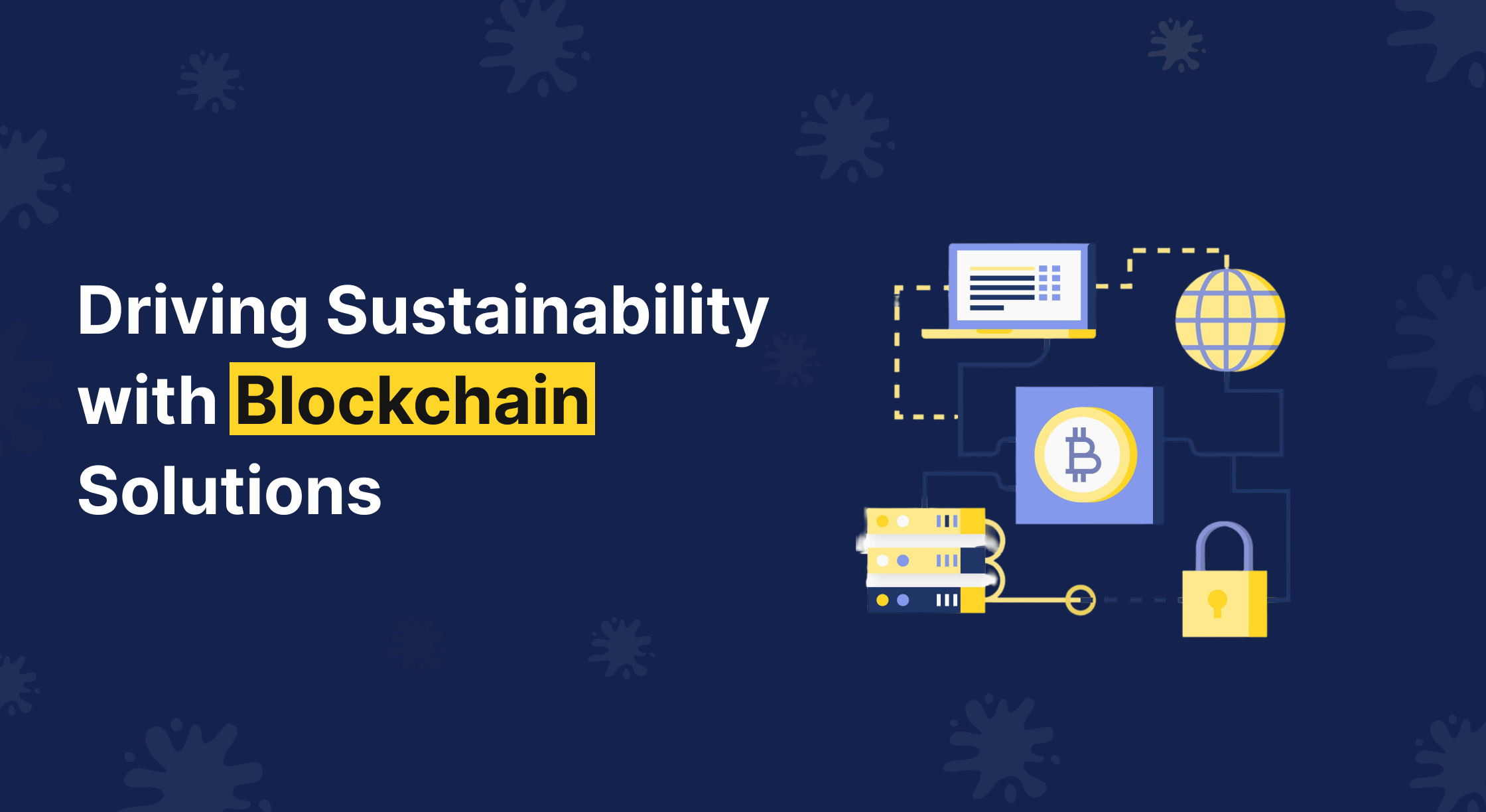
Blockchain and Sustainability in Cross-Border Transactions
Beyond its potential to revolutionize industries, Another effective technique that blockchain technology may be used to promote is sustainable economic growth. Here's how:
Smoother International Trade: Blockchain can streamline cross-border transactions, making international trade faster and more efficient. This can benefit businesses of all sizes by reducing costs and paperwork.
Building Trust: The security and transparency of blockchain technology can help allay worries about confidence in international trade. The fact that it is easy for all parties to verify the legitimacy of transactions reduces the possibility of fraud and corruption.
Encouraging Collaboration: Blockchain can facilitate collaboration between governments, NGOs, and other organizations working towards sustainable development goals. It can create a secure platform for sharing information and resources efficiently.
Promoting Inclusion: Blockchain can empower individuals and small businesses by giving them greater control over their financial transactions. In developing countries where access to traditional financial services may be limited, this can be of great assistance.
Blockchain and Sustainability In Gender Equality
Imagine a world where women have equal access to the financial tools and services that empower them. Blockchain technology is making this possible, particularly in the field of financial inclusion.
Traditional financial systems pose significant barriers for many women worldwide. They often face difficulties accessing bank accounts, loans, and credit, which limits their full participation in the economy. Blockchain provides a secure and transparent alternative, bypassing traditional gatekeepers like banks. This creates opportunities for a more equitable financial environment where women can engage equally.
Blockchain empowers women with improved tools for managing their finances. Imagine a personal and secure financial record that is controlled only by you. This can be facilitated by Blockchain technology, enabling women to track their income, expenses, and savings with greater transparency. They can now confidently prepare for the future and make well-informed financial decisions thanks to their newfound autonomy.
Blockchain And Sustainability In Renewable Energy Integration
Climate change demands a massive shift towards renewable energy. Blockchain can be a game-changer here, offering innovative ways to integrate clean energy into our power grids.
Imagine a future where you and your community can generate your renewable energy using solar panels or wind turbines. What's even better? You can trade this energy directly with each other! Blockchain makes this possible by creating decentralized energy grids. These grids bypass the traditional, centralized systems, giving communities more control over their energy needs. This empowers them to become more energy-independent and participate in a more sustainable energy market.
But how can we be sure the energy is truly "green"? Time and effort are required to verify the source and environmental impact of renewable energy. Secure and transparent records are created by blockchain platforms to address this issue. This transparency acts as a catalyst, encouraging investment in clean technologies.
Previously, small-scale renewable energy producers, like those with rooftop solar panels, faced difficulties when connecting to the existing power grid. This process is streamlined by blockchain technology, providing a platform for direct connection with consumers and selling excess energy. Individuals and communities are empowered to actively contribute to a cleaner energy future.
The benefits go beyond individual participation. Blockchain allows for the creation of "tokenized" renewable energy assets. These tokens represent ownership or investment in specific clean energy projects. This innovative approach allows anyone to directly invest in a sustainable future, fostering a more robust and diverse green energy market.
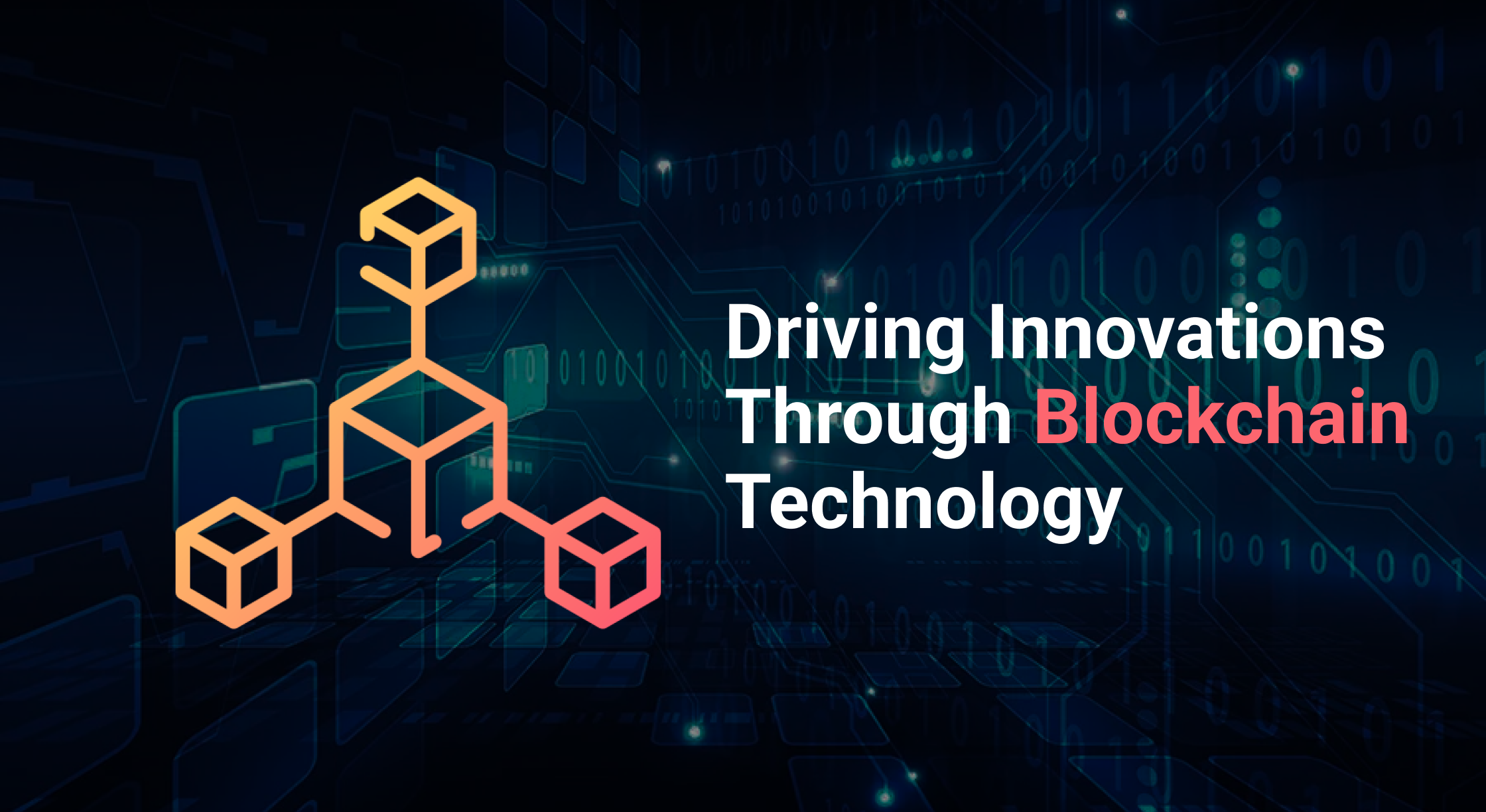
Blockchain and Sustainability In Supply Chain Management
A primary way how can features of blockchain support sustainability is through supply chain transformation. It is becoming an increasingly powerful tool in this effort. By its very nature, blockchain offers a decentralized and tamper-proof record of every step a product takes, from raw materials to finished goods. This enhanced transparency empowers both businesses and consumers.
Imagine a system where you can trace the origin of your coffee beans, ensuring they are ethically sourced and grown. Or picture tracking a garment's production process, verifying fair labor practices were upheld. Blockchain makes this possible by creating a comprehensive record of every transaction, movement, and transformation within a supply chain.
But the benefits go beyond simple visibility. Blockchain-based smart contracts can automate compliance with sustainability standards. These self-executing contracts can be programmed to ensure products meet specific environmental regulations or fair labor practices. This reduces the risk of human error and streamlines the process, creating a more reliable and sustainable supply chain ecosystem.
Blockchain technology acts as a beacon of transparency within supply chains, empowering businesses and consumers to work together towards a more sustainable future.
Blockchain and Sustainability in Carbon Credit Ecosystem
Facing the Supervillain of Climate Change: Picture this, the Earth is up against a formidable supervillain – climate change! Its weapon? Greenhouse gas emissions. Fortunately, a new hero is emerging to help us in this battle – blockchain technology! But what exactly is blockchain, and how can it help us tackle this environmental challenge? Let’s break it down in a way that’s easier to understand than a complicated science experiment.
From Guesswork to Green Guru: Measuring a company’s carbon footprint can feel like trying to count grains of sand on the beach – confusing and often inaccurate. Enter blockchain, the ultimate record-keeper! Imagine a transparent and secure digital ledger where companies can precisely track their carbon footprint. No more guesswork – just clear, verifiable data available to everyone. This transparency helps companies understand their environmental impact better and take meaningful steps to reduce it. Preventing Double-Counting with Digital Fingerprints: What about double-counting? Blockchain prevents this issue by assigning each carbon credit a unique digital "fingerprint." This ensures each credit is only counted once. These credits are securely stored on the blockchain, which eliminates fraud and builds trust in the carbon market. As a result, the carbon market becomes a more reliable and effective tool in fighting climate change.
A Marketplace Fit for a Superhero: Imagine a world where companies can confidently buy and sell carbon credits, like trading superhero cards! Blockchain makes this possible by creating unique digital tokens for carbon credits, enabling an open and efficient carbon offset marketplace. Blockchain transparently tracks every step, from credit creation to ownership transfer, like a live-streamed superhero battle. This transparency fosters trust, making the market a reliable ally in the fight against climate change.
Automating the Green Machine with Smart Contracts: Remember those helpful robots that assist superheroes? Blockchain has its version – smart contracts! These self-executing agreements ensure companies uphold their environmental commitments. Think of them as automated assistants keeping companies accountable. This automation leads to real reductions in emissions, like a superhero weakening the villain with each move! Blockchain technology thus supports a global carbon market that funds climate solutions, like building a mighty, automated army to clean up the planet.
The Superhero Suit for a Sustainable Future: In the fight against climate change, blockchain acts like a superhero suit. It offers a secure, transparent, and efficient way to manage carbon credits, helping companies become more environmentally responsible. This, in turn, leads to a cleaner, more sustainable future. With the support of blockchain, we can take meaningful action against climate change and create a healthier planet for future generations.
Blockchain and Sustainability For Transparent Governance
By leveraging blockchain platforms, communities, and organizations can establish transparent and inclusive governance models. Think of it as creating a giant team rulebook that everyone can access and understand, ensuring fairness and transparency in decision-making. With blockchain, there are no more backroom deals or decisions made by a select few. Instead, everyone gets a say in how the team operates and which sustainability initiatives to prioritize. It's like having a pre-game huddle where everyone strategizes and collaborates on a winning plan for the environment
In the blockchain ecosystem, secure and transparent voting platforms are provided, ensuring that every voice is heard and counted. Voting on critical decisions, such as fund allocation for impactful environmental projects, can be imagined. Blockchain securely records every ballot, minimizing the influence of any single leader and empowering communities to take charge of their sustainability journey. It resembles having a digital voting booth where every vote is guaranteed to be counted.
And wait, there's even more! Blockchain can help us create something truly groundbreaking – Decentralized Autonomous Organizations, or DAOs for short. Think of them as elite, self-governing teams with a crystal-clear mission: to achieve sustainability! DAO members, just like teammates dedicated to winning a championship, collectively make decisions and allocate resources based on pre-defined rules. These rules are all recorded securely on the Blockchain, acting like a team constitution that everyone agrees on and can easily access. It's like having a playbook for environmental action that's transparent and readily available to all team members!
The potential of this approach isn't just some futuristic fantasy. Actual, groundbreaking research published in the highly respected journal Nature highlights the need for "crypto governance" – a fancy term for using Blockchain to improve decision-making. And guess what? This concept is already being put into practice! OneEarth, a groundbreaking sustainability platform, empowers users and donors to participate in a decentralized decision-making process. Voting on how their funds are allocated to climate action initiatives gives them a sense of social ownership and environmental responsibility. Imagine a team where everyone contributes financially and has a say in how to tackle ecological challenges – that's the power of DAOs!
This decentralized governance framework acts like the ultimate team-building exercise for the green dream team, promoting participation, fostering innovation, and empowering communities. As blockchain technology advances, it has the potential to become an even more crucial tool for collaborating and driving positive environmental change
The Final Word For Blockchain and Sustainability
Numerous features of blockchain support can enhance sustainability efforts across various sectors. It serves as a foundational infrastructure essential for addressing environmental and social challenges, including enhancing supply chain transparency, ensuring accountability, and facilitating the integration of renewable energy.
By leveraging the unique features of blockchain support, organizations, and communities can develop digital transformation solutions for a more sustainable future. Transparency, traceability, decentralization, and immutability are innovative aspects of blockchain that enhance sustainability efforts and promote new standards and frameworks, thereby improving the overall business ecosystem for the planet
A Note of Caution: While Blockchain is exciting, it's not a magic solution. The term itself has become a buzzword, and its implementation needs careful planning. For maximum impact, it needs to be integrated with existing technologies and environmental regulations.
Collaboration is Key: Through persistent research and cooperation between businesses, policymakers, and tech companies, blockchain technology has the potential to advance our global environmental agenda significantly. Together, we can fully utilize decentralized technology to create a Custom Blockchain Application for a sustainable future.
Frequently Asked Questions
What is not a feature of blockchain?
A centralized digital ledger is not a feature of blockchain, as blockchain is fundamentally decentralized. The characteristic of centralization does not align with blockchain's core principles.
What is the role of decentralization in blockchain?
Decentralization in blockchain technology distributes control across a network of computers, eliminating reliance on a central authority. This ensures transparency, security, and trust by preventing data manipulation. Each participant holds a copy of the ledger, making it tamper-resistant and highly reliable.
What is blockchain in green finance?
Blockchain technology is driving sustainable green investments by enabling transparent and efficient green digital finance. With growing support from governments and private organizations, it is shaping the future of green finance and promoting long-term sustainability.
How is blockchain used in waste management?
Blockchain technology enhances waste management by ensuring secure, transparent tracking from generation to disposal. Its immutable records promote accountability, prevent illegal dumping, and incentivize sustainable recycling through tokenized rewards.
How does blockchain reduce food waste?
Blockchain technology minimizes food waste by enhancing traceability and transparency across the supply chain. It helps businesses identify inefficiencies, optimize processes, and make informed decisions to reduce food loss
How blockchain can help in reducing fraud?
Blockchain technology combats fraud by offering a transparent, immutable, and decentralized ledger where every transaction is securely recorded. Its distributed nature makes data manipulation nearly impossible, as altering records would require consensus across the entire network, creating a strong defense against fraudulent activities.
Recent Blogs
What is Meant by Trustless Transactions in Blockchain?
Discover how trustless transactions in blockchain eliminate the need for intermediaries, ensuring transparency, security, and automation through smart contracts. Explore the future of decentralized, trust-free transactions
How To Build A Responsive Website
Discover the importance of responsive web design and how to create a mobile-friendly website that adapts to any screen size. Learn essential tips to enhance user experience and boost your site's performance.
Benefits Of Using WordPress For Your Ecommerce Website
Discover the benefits of using WordPress for your ecommerce website. Learn how WordPress and WooCommerce offer flexibility, customization, and scalability to grow your online store effortlessly.
Quick Links
Our Offices

USA
12828 Willow Centre Dr Ste D #978 Houston, TX 77066
PAKISTAN
Suite # 207, 2nd Floor, Park Avenue Building, Block 6, P.E.C.H.S, Shahrah-e-Faisal, Karachi.Contact Us
© 2024 Expedey. All Rights Reserved.

